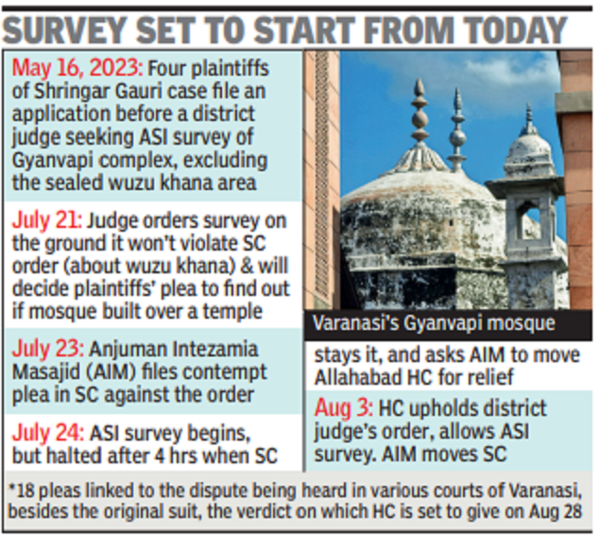Dismissing mosque custodian Anjuman Intezamia Masajid’s (AIM) writ petition challenging district judge A K Vishvesha’s July 21 order as “lacking substance”, Chief Justice Pritinker Diwaker said the HC wouldn’t deny either party in the suit the right to be present during the exercise.
Within hours of ASI approaching the Varanasi DM for logistic support to start the survey from Friday, AIM moved the Supreme Court seeking an urgent stay on the HC order “on account of grave risks posed by such an exercise (ASI survey) that may have consequences throughout the country”. Making an exception to the rules that prohibit mentioning of petitions for urgent hearing before a Constitution bench, CJI D Y Chandrachud assured AIM that he would look into the email sent for urgent listing and pass an order. The petition filed by AIM is listed on Friday.

The Varanasi court was “justified in ordering an ASI survey of the premises”, Diwaker said. “It is a settled proposition of law that the issue of a commission, at this stage, is permissible. In the opinion of the court, the scientific survey/investigation proposed to be carried out by the commission…shall aid the trial court to arrive at a just decision.”
On the mosque committee’s contention that it wasn’t the court’s business to order collection of evidence, the 16-page HC verdict states, “…The court may, if it thinks it necessary or expedient in the interest of justice to do so, issue a commission to such person as it thinks fit, directing him to inquire into such question and report thereon to the court.”
Diwaker also rejected AIM’s argument that ASI couldn’t arrive at any conclusion without digging the site. “Many new things have been developed and now, with the help of new technology and the able guidance of responsible officers of ASI, a scientific investigation can be made,” his order says.
On July 26, an ASI officer of the rank of additional director of ASI submitted in an affidavit that a team of experts would survey, document, photograph, detail and study the Gyanvapi complex without harming the existing structures.
The Muslim side’s plea that the suit was barred under the Places of Worship (Special Provisions) Act, 1991, wasn’t considered by the court. “This question is not the subject matter, for the time being, because none of the parties has raised any grievance before the court while making their submission in support of their applications,” the verdict states.
Within hours of ASI approaching the Varanasi DM for logistic support to start the survey from Friday, AIM challenged the high court’s order in the Supreme Court.
Advocate general Ajay Kumar Misra, appearing for the state, had argued that the order of the Varanasi court was meant “to ascertain the truth” and that “there cannot be any issue between the plaintiff and the defendant” regarding this.
The court of the district judge had originally asked ASI to submit its survey report by August 4. AIM challenged this in the Supreme Court, which halted the scientific survey and asked the petitioner to appeal in the high court.
The original case dates back to August 2021, when plaintiff No 1 Rakhi Singh and four other women moved the Varanasi civil judge’s court for the right to unhindered daily worship of Shringar Gauri and other deities along the outer wall of the Gyanvapi complex.

04:41
Gyanvapi: Allahabad HC to pronounce verdict on August 3, stay on ASI survey to remain till then
This led to a court-mandated survey of the complex in May 2022, in which a Shivling-like structure was found in the ablution pond of the mosque.
#Asi #ASI #survey #Gyanvapi #sake #justice #Allahabad #India #News

Leave a Reply